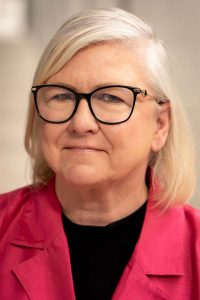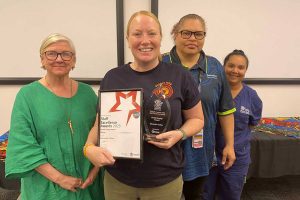
Adj Prof Jackie Hanson, Chief Executive
This week the Prime Minister announced that the Voice to Parliament referendum will be held on Saturday 14 October. No matter what your view is, it is important to be informed to make your decision. The Public Sector Commissioner also sent an email this week with a link to guidance for public sector employees when talking about the Voice to Parliament.
Have Your Say survey
The local Have Your Say staff survey results will be disseminated throughout September across all areas. On Monday at 10am I’ll be joining Chief People and Culture Officer Kristal Lowe for a vidcast talking more about our Have Your Say staff survey results across Metro North. Please join us as we share some of the key themes, and how the survey data will be used in the coming weeks and months.
As part of the survey, participants were able to send me a “message in a bottle”. There are more than 4000 of these messages that I’ve been working my way through. One message that has captured the tone of many I’ve been reading said: In the past surveys I have been a lot more critical, but this time around while answering the questions I realised how much my workplace has changed for the better. The tide is changing for the better. Keep up the good work.
Thank you to whoever made this comment. Metro North has been actively responding to feedback in previous surveys as well as changes within the health environment. We have developed a range of staff development and wellbeing programs. We have also introduced the Staff Shout Out portal in addition to the formal reward and recognition programs.
Nominations for the Metro North Research Excellence Awards closed this week and judging is now underway. The awards celebration will be held in November. People and Culture are also putting together a working group for Operational Services staff recognition.
I also received this message in a bottle: Plan for more skilled and different skilled workforce for the 21st Century.
Metro North is in the final stages of consultation with staff and stakeholders for a workforce roadmap which includes nonclinical staff. If you have thoughts or would like to comment please email MNHWorkforceReform. Staff will also have the opportunity to provide feedback at roadshows across all directorates in a few weeks.
Jane Hancock and I are continuing to conduct listening posts so staff can meet directly with us. The next one will be 27 September at Redcliffe Hospital. In October we’ll be visiting Brighton Health Campus and TPCH.
Another session I’d recommend everyone join is the Benestar Building Mental Fitness Webinar coming up on Tuesday 19 September from 1pm. This webinar will explore how we can learn to adopt practical self-care habits.
Redcliffe Staff Excellence Awards
 Congratulations to all the winners and nominees from Redcliffe Hospital’s Staff Excellence Awards this week. It was great to share the celebrations on the day with the nominees and their peers.
Congratulations to all the winners and nominees from Redcliffe Hospital’s Staff Excellence Awards this week. It was great to share the celebrations on the day with the nominees and their peers.
Redcliffe Hospital presented a new award this year, recognising staff and teams for their commitment to Health Equity.
Redcliffe’s inaugural Health Equity Award was presented to Samantha Cullen for her work establishing the Deadly Feet program at Redcliffe Hospital. Deadly Feet is a specialist multi-disciplinary outreach service for Aboriginal and/or Torres Strait Islander peoples. Redcliffe’s Staff Excellence Awards are proudly sponsored by QSuper, part of Australian Retirement Trust.
Personal email accounts
A reminder to all Metro North staff and clinicians that private and non-government email addresses (like Gmail, Yahoo, Hotmail, and iCloud) must never be used for work purposes.
The use of a non-government email accounts for work purposes presents an information security risk and prevents the proper management of records. It’s our obligation to keep patient information secure.
Introducing CALD Assist
Metro North has launched the use of the CALD Assist app. The app is free to download and supports staff and clinicians working with patients who have limited English language proficiency, in low-risk clinical situations.
The app was developed by the CSIRO in conjunction with health professionals, interpreters and patients. It’s not designed to replace the use of interpreters, but it does include over 250 commonly used phrases in 10 different languages.
Kind regards,
Jackie.